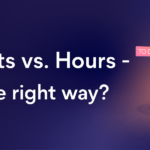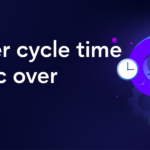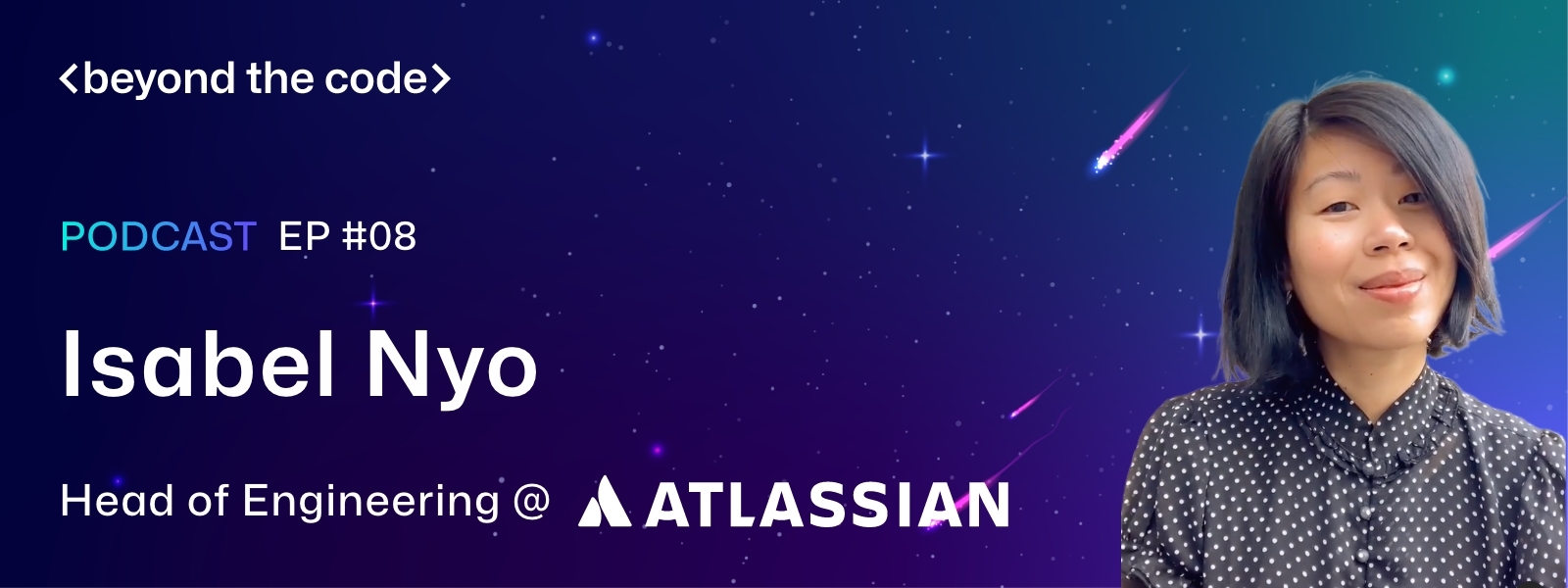In our recent episode of Beyond the Code, host Kshitij Mohan, founder of Typo welcomes Isabel Nyo, Head of Engineering, Atlassian Australia. The focus of their discussion is on growing development teams in a sustainable way.
The podcast begins with a fireside chat with Isabel Nyo, providing us a glimpse into her personal journey. She places valuable insights into building engineering teams that foster a culture of transparency and excellence. Isabel also shares specific metrics she utilizes to gauge her team’s velocity and satisfaction. Further, she delves deeper into the framework – C.A.R.E. explaining how it plays a pivotal role in instilling a product-driven mindset among engineers.
Lastly, Isabel addresses the challenges faced by women in the tech industry and how individuals and the industry as a whole can work collaboratively to break down these barriers and create a more inclusive, equitable, and diverse tech ecosystem.
Time stamps
- (0:06): Isabel’s background
- (0:46): Isabel’s six books
- (2:14): Fireside chat with Isabel
- (7:19): Building engineering teams as CTO
- (9:58): Challenges faced when building engineering teams
- (12:17): Specific metrics used to measure team’s velocity and satisfaction
- (14:00): Atlassian work culture
- (14:58): C.A.R.E framework
- (20:20): Women in tech industry
Links and mentions
Episode Transcript
Kshitij Mohan: Hello everyone. I’m Mohan your host back with another exciting episode of Beyond the Code by Typo. Today’s guest needs no introduction in the engineering community. She is the head of engineering at Atlassian Australia. She has been a part of the engineering ecosystem for more than 20 plus years, and believe it or not, she has authored six books.
She actively speaks about winning a positive change for women in tech. Actually, she has done it all. She’s her. She is Isabel. Hello Isabel. Welcome to the show.
Isabel Nyo: Hi. Thanks for having me, and thanks for the really nice introduction about me.
Kshitij Mohan: Thank you so much, Isabelle. It’s an honor to actually host you here, so thank you for sharing your time with us.
Isabel Nyo: No worries.
Kshitij Mohan: Perfect. So before, before we start, I think this is one question that has kept me intrigued since the time we started doing this podcast with you. How have you been able to author six books, Isabel? How have you been able to find this time of doing everything while you have been doing a lot?
Would love to hear your experiences around that.
Isabel Nyo: Yeah. This is the question that I get asked often, and the thing is that it’s not like I was writing all the six book at once. So my first book was written. In 2018, and the last one was written in 2022, so just last year. So it’s more about the incremental improvement and incremental delivery, so to speak. In software development, you know how we have got like the HR and incremental development, so if you look at things after a while, you think that people are doing a lot of things at once, but that’s not really the reality. It’s more about taking time, taking step by steps, and after a while you feel like you have reached the top of the mountain and that’s what it’s, in this case.
Kshitij Mohan: Well definitely, but Isabel still four years and six books.
I think a commendable job. Definitely. So kudos to you! Perfect. So, in your entire career span, you have seen it all. You have built teams, scale teams, and I think while doing all this, the biggest challenge is how do you do it in a sustainable way? So I think today we would love to talk about, growing dev teams in a more sustainable way. But I think before we do that, we would love to have this fun fireside chat with you where I’d ask this quick series of questions. And we would love Isabel to answer this for us and so that we get to know you better and feel free to be as candid as possible Isabel. So if you’re ready, we can get started.
Isabel Nyo: Yeah, let’s go for it.
Kshitij Mohan: Perfect. Let’s go for it. So question one, what do you like more Isabel coding or leading teams?
Isabel Nyo: So when I was a developer, and this was about 15 years ago, I really liked coding and I couldn’t imagine being a manager and I didn’t become a manager for a while because I really enjoy building things from nothing or solving complex problem. However, throughout those time, I found myself mentoring other developer and teaching them on how to solve problem and stuff like that. And I found that I was quite good at it and slowly I took into the management career part. And now I can honestly say that I enjoy management as well. I like that I am able to make positive impact on the professional and personal development of people through being their manager. I find that I am able to have more impact, and this is my personal opinion. It doesn’t mean that if you are a software engineer, you don’t have as much impact. It’s just for me, I find it really rewarding to be able to steer the ship in the right direction and help them grow.
So I like both, but right now I’m very happy in my role as a Manager.
Kshitij Mohan: Question two, What’s your source of energy that gets you through the tough days?
Isabel Nyo: I like to go for long walks, so I usually have like a 10,000 or 15,000 steps a day. And when I’m going for a walk, I like to listen to music or podcast. So I will definitely be listening to this one as well, actually helped me clear my mind and it helped me to be more productive.
So that’s where I get my source of energy. Perfect. So that’s!
Kshitij Mohan: That’s how you find your zone basically.
Isabel Nyo: Yeah. Yeah, that’s right.
Kshitij Mohan: Perfect, perfect. Next question. You have written six books now, so which one’s the one that you feel has shaped you most as an author?
Isabel Nyo: So I actually thought about this question a little bit, and I have to say, honestly, there’s no one single book that has shaped me to be who I am as a writer, because as I said earlier, every time I write a book, I learn a lot from it.
And I’m feeling that I’m improving it incrementally improving the craft of writing. And one of the central theme and the central reason for me to write is to share my knowledge and insight with other people. So, I feel that I’m getting that from writing, and it doesn’t matter how many books that I have written, I still feel this sense of satisfaction and responsibility, and purpose with what I’m sharing.
Kshitij Mohan: Definitely. So every book holds a special value in your heart. Definitely. Right? Perfect. Next question, Isabel, what’s that one tech myth you wish people would stop believing?
Isabel Nyo: This is a good one. So I wish people were believing that innovation has to be big and disruptive. There’s a lot of time where you can innovate based on incremental improvement or making things better or easier. It doesn’t have to be groundbreaking or something new and disruptive all the time. And this is a myth that we have in the tech industry, and we believe that innovation is only one. You create something that nobody has thought about. That’s not true.
Kshitij Mohan: Oh this is sweet Isabel! So even small changes can lead to bigger impact, so definitely. Perfect. One last thing. What’s that one most memorable eureka moment you feel in your career?
Isabel Nyo: So I think it was when I was a developer, so I was working for this company and we were doing a very challenging and complex project, and I was only with the company for about a few months. So I wasn’t the most senior person or most tenure person in the company, but I found a lot of people who are not developer were coming up to me with their questions or giving me their feedback, and I found that my approach to collaboration has really helped bring people together. And when there were problem, I was able to be the voice for them. So this has really helped me understand having a diversity of voice, really bring people together and make the outcome of the collective better.
Kshitij Mohan: Perfect. So that’s where the leadership journey of Isabel started, I guess.
Isabel Nyo: Yeah. You can say that. Yes. So that’s my approach to how I collaborate and how I work as well.
Kshitij Mohan: Perfect. Thank you so much, Isabel. This was, this was really fun, and thank you for being so candid. Now let’s get into the real stuff. Right? So, given the kind of vast, amazing experience you have had, you have held multiple positions, right? From CTOs engineering leaders, I think today what we would love to start with is your experience as a CTO, right? So, what do you think is that interesting reality about building dev teams as a CTO that’s kind of counterintuitive for others. What do you think has been that key insight for you while building your engineering teams?
Isabel Nyo: So earlier in our conversation you were talking about how to build sustainable teams, right? Yes, right. So I think one of the counterintuitive fact for engineering leader is that we need to understand that less can sometime be more so in a world where we always think about having a lot of PR or lots of codeship or lots of code written. As technology leader, we need to understand that sometimes small things can actually lead to big results. And let me explain what I mean by that. So for technology leaders, we should focus on quality. Rather than quantity. So rather than pushing for a large volume of code or a large number of feature, we should encourage team members and engineer to take the time to write clean and maintainable code, make sure that there’s enough trust in it, and think about reliability and scalability as part of the development and this will lead to actually sustainable process. And this is just one part of it. And second part of it is around how we work and our way of working. So often CTOs or tech leader are the people who are very smart and they are problem solver. So when they become manager, it takes them a while to really understand what leadership is all about and they need to take a step back and actually, speak less and listen more. So this is where speaking more is actually detrimental to their success as a leader. And less is actually more so when it comes to way of walking. They also need to take a step back and give room and space for people or engineers on the ground to grow to really help them achieve success in their team and to to have great result as a team, not just from one individual, but a collective. So these are the counterintuitive belief that I have around less is actually more and more is sometime less.
Kshitij Mohan: No, definitely and while you talked about, although this is very close to building the right and fostering the right set of culture as well in the, in the dev teams, right? So this culture of transparency, culture of excellence, and I’m pretty sure you must have faced certain set of challenges while building that culture because its not easy to set the right foundation for everyone to grow and evolve from there. Right? So any thoughts on that? How have you been able to do that?
Isabel Nyo: So when it comes to creating a culture of engineering excellence or culture of continuous improvement, I have found that setting this culture or instilling this culture, take a while. And it might.. It’s often very hard to reverse the culture. So let me give you an example. A while ago I inherited a team that was looking after a large code base, and this team was under a lot of pressure all the time because they have a huge tech debt. They were always busy firefighting, and they had no time to do like innovative project or feature development. And this actually impacted their velocity as well as their satisfaction. And this is the result of not having a continuous improvement culture. And they were too focused on shipping things quickly and not taking into consideration the impact that it has on the technical infrastructure and the platform. So, In this case, what I did was, and what I would advise all the senior engineering leader to think about in terms of fostering a continuous improvement and continuous engineering excellent, is to have an understanding of the current state. How is the infrastructure like what are the bottlenecks that the system has got? And once you understand the current state, you might need to make decision around what are the things that you need to fix immediately and make room for it. In product development, we often have roadmap, right? Like you have roadmap with things that you need to ship, and we need to have the same from the technology perspective as well.
You need to have a technology roadmap and it needs to have a plan and the vision and strategy so that we can have this continuous improvement culture in the technology as well.
Kshitij Mohan: Right. Perfect. And while talking about this, so you mentioned two critical aspects, right, that every leader talks about, about this velocity, the satisfaction part, right? Any specific metrics or any specific way that you have been using to understand, Hey, how my current team’s velocity is, , or how my team satisfaction levels look like? Any specific thoughts on that? Have you been able to kind of objectify this entire approach?
Isabel Nyo: So, in terms of how do we gauge the satisfaction level as well as the stability of the platform, so to speak, or the engineering excellence I recommend two kind of metrics. The first metric is the Quantitative metrics and you can use Dora metrics for that. So how like number of incident, what is the change failure rate and things like that are really good way to gauge the number around how things are going. And you can see the trend as well. So for example, if you see the trend of number of outages increasing over a few months, then you can see it clearly that something needs to be done. So that is the quantitative. The other side of it is qualitative metrics, and this is where you need to have conversation with engineers and speak to their engineers to find out how things are going for them, because sometime things may look rosy on the outside, but engineers may be feeling like they are not being productive or they don’t understand what they’re doing. They don’t understand the big picture. So this kind of information can be gained by having survey or speaking to engineers on the ground.
So I would recommend not looking at just the quantitative metrics.
Kshitij Mohan: Quantitative level. Yeah. We’re bringing things together. Yeah, totally. Totally. This makes sense and by talking about culture, it would be so not good without talking about the Atlassian culture. I think you have been in that culture for too long. So any specific things that you really love about being a part of the Atlassian culture?
Isabel Nyo: So we, Atlassian, one of the reasons why I joined Atlassian about five year ago was because of the value. So we have a few value for Atlassian and one of the values that really resonate with me is be the change that you seek. So Atlassian really encourages people to take ownership of whatever area that they are passionate about, regardless of who they are or what kind of role they play. So for example, I’m a head of engineer, but if I feel that there’s some process improvement that need to be done, even though I’m not a program manager, I am more than welcome or encouraged to bring this, bring about change in that area as well.
Kshitij Mohan: Whoa. This is so cool. Perfect. And so just moving forward to it, right? Recently there has been a lot of talk about product-driven mindset, right? Experimenting, innovating. Everyone continuously talks about, Hey, how do we actually are more focus on this so in order to evolve more, right? But I think the biggest challenge that would be is how do you translate this thought from the leadership team till the actual engineering level, like every engineer feeling and aligning with the same mindset, but what’s your thought on this entire process and approach?
Isabel Nyo: So I actually have a framework that I use in, in terms of bringing about product-driven mindset to engineer, and you are absolutely right in this world where we are always creating something, whether it’s a platform product or the product that consumer use, we need to understand how to bring about this change and how to instill into the engineers.
So the framework that I use, I tell you an acronym, so it’s called C.A.R.E. And each acronym or each letter stand for something. So C, stand for clarity. Clarity means everyone in the organization or every engineer, every product manager, they understand, what is the success that they are working towards. Oftentimes, I see a disconnect between what the business is trying to achieve and what the engineer are asked to. And this is very important to provide this clarity because once people understand the big picture, they can actually make changes or they can actually ready for things to be done. So clarity is very important and my job as a leader is to provide this clarity to people that I work with. The second letter is A, A is autonomy. And earlier I was talking about one of the value that really resonate with me is be the change that you seek. So giving autonomy to people means that you give them what is the success criteria, or you tell them what are the guide rate that you have. They can decide on the how or they can even decide on the initiative that they are gonna work on to meet the details or to achieve the goal. So autonomy is really important. And autonomy also bring about engagement when people feel like they are allowed to make decision that impact things that they are doing. Whether it’s the technology choices or how they would solve a particular problem, it really motivate them and provide them with the sense of ownership. The next one is, so we talked a little bit about the product driven mindset. When it comes to product driven mindset, we need to understand who we are solving the problem for, and we are solving the problem for customer, but we might not know how to solve these problems. So it is important to take calculated risk and measure as you go. So this is where experimentation come in handy. You might need to do small incremental improvement, and you might need to learn from it regularly. And this require everyone to be comfortable in taking risks and the way my role come in as a leader is to make space for people to feel comfortable, to take risks, and also not only to celebrate successes, but also failure as long as we learn from the mistake that we made. So R is risk-taking. And the last one, the last letter is E, and E stands, for example. So leading by example, and this is the fundamental trait of any great leader. They need to lead by example. So it is not enough to tell people what to do. You need to show them the way and you need to demonstrate the principle and value that you want people to embody. So when it comes to the product thinking mindset and product development, this mean as a tech leader, I’m engaging closely and collaboratively with my product managers and product conduct because this is what I would like to see from my engineer as well. And this also mean me being curious about. What are the pain points for customer, how they are feeling, what they’re using, and what problem they have, and also understanding what are the business metrics that we need to meet in order to be successful as a company. So these are the things that I really try to do and I do in order to foster a continuous improvement and product thinking mindset in engineers. So I think gones were the day where engineers do engineering work, do their own craft and designer do design. This day everyone needs to be aware of each other craft and has empathy for each other expertise and knowledge.
Kshitij Mohan: Wow, Isabel. So you kind of transformed this entire approach into C.A.R.E. So C is for Clarity, A for Autonomy, R for Risk taking, and E for Example, leading by example. Wow. This is mind-blowing, Isabel. Perfect. Thank you for sharing this, actually. So I think this definitely is highly insightful for each and every engineering manager trying to foster this culture. Perfect. I think lastly, we’d love to talk about a topic that’s really close to your heart, right? You have been actively writing, speaking a lot about women in tech trying to bring a positive change, right? So we would love to understand your experience and what do you think could be done to change the entire narrative around it?
Isabel Nyo: So I’ve been in the tech industry for about 20, 21 years, or more than 20 years, and in this journey I’ve had both good and bad experiences, but good experiences are where I have worked with people who are very inclusive, who celebrate diversity of voices and who would make room for me or who would make time for me to hear my point of view. However, on the other hand, I’ve also faced situation where people would dismiss me because of who I am or how I look, or the way that I think. And sometime I had to prove myself twice or three time as much in order to get the same respect or in order to get the same level of treatment as my male counterpart in the tech industry.
Regardless of all this, I think we are improving in terms of being more open, being more accepting, and being more appreciative of different kind of people and their thought process and the perspective that they bring to the group. So personally, I have a daughter and she is 11 year old and she is in her last year of primary school. And in about maybe a decade, in 10 years time, she will enter the work phase, and what I will hope is that she is treated equally as her male counterpart, regardless of whether she wants to take a job in technology or science or not, or medicine or whatever. And in order to do that, you ask a question about what we can do to change the narrative. I think there are a few things that we can do right now. Firstly, we need to educate other, we need to educate everyone and we need everyone to be aware of the problem that we are having or challenges that…
Kshitij Mohan: So the folks don’t even know that they’re doing it. No, exactly.
Isabel Nyo: That’s right. So sometime there’s this subconscious bias and people like people who look like them. So if you have a room full of male developer, they might think whatever they are doing is okay, but it could exclude certain people who are not like them. So education and awareness is really important. So there are a lot of trainings around unconscious bias. You can read books about what are the different.. How different gender thinks, different perspective, not just gender, by the way, it’s also cultural as well. So people try and educate themselves and have awareness around these differences. Then there should be sponsorship and advocacy. I say this because sometime we tend to promote or celebrate people again who are like us. So unless you have some conscious effort to try and celebrate, People or different voices, then there will not be enough representation in this industry.
So representation matter and sponsorship in order to have enough representation, sponsorship and mentorship matter. And lastly, I would say we need to come together as a group. It is not about us versus them. I’m doing this podcast with you and it’s not… We’re like, we are trying to make a change together.
So it’s important for everyone to come together and make a change as a collective rather than saying, okay, you, the problem is with female. So the female representative group should be doing something and male don’t need to be involved, or female shouldn’t feel like they should be the one pushing for change. It should be on everyone responsibility to bring about change because we can be better together.
Kshitij Mohan: Well, definitely I think that this is, thank you so much, Isabel. So this is a really important lesson for I think each and every one of us. How do we come together and build this inclusive culture?
Because that’s how we can all grow and evolve together. And definitely we all hope Isabel, that pretty soon as you mentioned, right? I would say not even a decade, let’s just do it as fast as possible and to just make this world a better place for everyone to work. So definitely thank you. Thank you so much Isabel, this was a really nice conversation. We’re kind of humbled to have you here and thank you for being so candid and opening your heart out with us and for all of viewers. So thank you so much, Isabel. Have a good day.
Isabel Nyo: Thank you. Thanks for having me. It has been fun. Bye.
Kshitij Mohan: Thank you.
Related posts:
 Impact of collaborative dev practices on software delivery’ with Andrey Adamovich, CTO at VLAVI group
Impact of collaborative dev practices on software delivery’ with Andrey Adamovich, CTO at VLAVI group
 Story points vs. Hours – Which is the right way?
Story points vs. Hours – Which is the right way?
 Why prefer PR cycle time as a metric over velocity?
Why prefer PR cycle time as a metric over velocity?
 ‘Implementing data-driven approach for building efficient dev teams’ with Luca Rossi, Founder at Refactoring
‘Implementing data-driven approach for building efficient dev teams’ with Luca Rossi, Founder at Refactoring

